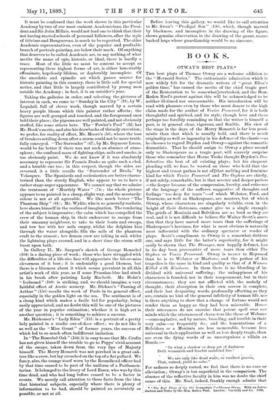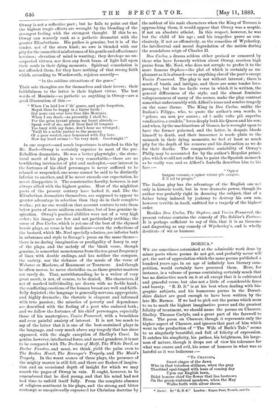BOOKS.
OTWAY'S BEST PLAYS.* THE best plays of Thomas Otway are a welcome addition to the "Mermaid Series." The enthusiastic admiration which is now widely felt for the dramatic writers of "great Eliza's golden time," has caused the merits of the chief tragic poet of the Restoration to be somewhat:overlooked, and the Hon. Roden Noel's protest against this will be acknowledged to be neither ill-timed nor unreasonable. His introduction will be read with pleasure even by those who must demur to the high claim made for the author of Venice Preserved, for it is both thoughtful and spirited, and its style, though here and there perhaps too forcibly reminding us that the writer is himself a poet, is in general clear, vigorous, and flexible. His view of the stage in the days of the Merry Monarch is far less pessi- mistic than that which is usually held, and there is much originality as well as ingenuity in his defence of the classic—as he chooses to regard Dryden and Otway—against the romantic dramatists. That he should assign to Otway a place second only to Shakespeare as a tragic poet, will scarcely surprise those who remember that Horne Tooke thought Dryden's Don Sebastian the best of all existing plays ; but his eloquent pleading will, we fear, be wasted on those who hold that the highest and truest pathos is not of Ithat melting and feminine kind for which Venice Preserved and The Orphan are chiefly, if not solely, remarkable, but is that severer and deeper pathos —the deeper because of the compression, brevity, and reticence of the language of the sufferer, suggestive of thoughts and feelings ‘. too deep for tears "—of which Webster, Ford, and Tourneur, as well as Shakespeare, are masters, but of which Otway, whose characters are singularly voluble, even in the height of their distresses, cannot give us a single example. The griefs of Monitnia and Belvidera are as loud as they are real, and it is not difficult to believe Sir Walter Scott's asser- tion that they have moved more tears than the sufferings of Shakespeare's heroines, for what is most obvious is naturally most influential with the ordinary spectator or reader of plays. Scott's compliment to Otway is a somewhat dubious one, and says little for the latter's superiority, for it might easily be shown that The Stranger, now happily defunct, has in its day been provocative of more tears than either The Orphan or Venice Preserved. Otway is nearer to Heywood than he is to Webster or Marlowe, and the pathos of his tragedies is the same in kind and quality as that of A Woman Killed with Kindness. In them there is no blending of in- dividual with universal suffering ; the unhappiness of his characters is founded, not in their temperament, but in their circumstances ; they are not afflicted with the malady of thought ; their absorption in their own sorrow is complete, and their last despairing words, profoundly affecting as they are, contain no hint of the general infelicity of human life, nor is there anything to show that a change of fortune would not render them as happy as they had been miserable. Hence their utterances do not exercise that potent spell over our minds which the utterances of characters like those of Webster —contemplative, sad by nature, brooding, and terrible in their very calm—so frequently do ; and the lamentations of a.
Belvidera or a Monimia are less memorable, because less universal in their application as well as less deeply tragic, than are even the dying words of so unscrupulous a villain as Bosola
"In what a shadow or deep pit of darkness Doth womanish and fearful mankind live !
........
We are only like dead walls, or vaulted graves, That, ruined, yield no echo."
For sadness so deeply rooted, we feel that there is no cure or alleviation ; Otway's is but superficial in the comparison. The absence of the reflective faculty in him was no doubt the chief cause of this. Mr. Noel, indeed, frankly enough admits that • The Best Plays of the Old Drdmatists,"—ThomnsOtiNty. With an Intro- ' duction and Notes by the Hon. Haden Noel. London : Vizetelly and Co. 1.
Otway is not a reflective poet ; but he fails to point out that the highest tragic effects are wrought by the blending of the strongest feeling with the strongest thought. If this be so, Otway can scarcely rank as a pathetic dramatist with the greater Elizabethans. His pathos is genuine, but it is of the tender, not of the stern kind ; no awe is blended with our pity for the unmerited misfortunes of his gentle and affectionate heroines; elevation of mind is wanting; they develope no un- suspected virtues, nor does any fresh beam of light fall upon their souls in their dying moments. Spiritual consolation is not afforded them, for they have nothing of that strong faith which, according to Wordsworth, rejoices secretly- " In the sublime attractions of the grave."
Their sole thoughts are for themselves and their lovers ; their faithfulness to the latter is their highest virtue. The last words of Monimia—as pathetic as anything in Otway—are a good illustration of this :— " When I'm laid low i' th' grave, and quite forgotten, Mayst thou be happy in a fairer bride ! But none can ever love thee like Monimia.
When I am dead,—as presently I shall be,
For the grim tyrant grasps my heart already,—
Speak well of me, and if thou find ill tongues Too busy with my fame, don't hear me wronged ; 'Twill be a noble justice to the memory Of a poor wretch once honoured with thy love.
How my head swims !—'tis very dark. Good-night 1" In one respect—and much importance is attached to this by Mr. Noel—Otway is certainly superior to most of the pre- Rebellion dramatists. He was a better playwright ; the struc- tural merit of his plays is very remarkable,—there are no bewildering intricacies of plot and underplot, —our interest in the fortunes of his chief personages is never suffered to be relaxed or suspended, one scene cannot be said to be distinctly inferior to another, and if he never exceeds our expectation, he never disappoints it. The constructive faculty, however, is not always allied with the highest genius. Most of the mightiest poets of the present century have lacked it, and, like the Elizabethan dramatists themselves, are supposed to appear to greater advantage in selection than they do in their complete works ; yet no one would on that account venture to rate them below poets of more uniform excellence, but of less genuine in- spiration. Otway's poetical abilities were not of a very high order; his images are few and not particularly striking; the verse of Don Carlos, which is yet one of the best of the rhymed heroic plays, as verse is but mediocre—even the reflections of the bastard, which Mr. Noel specially admires, are inferior both
in substance and style to Savage's poem on the same theme—
there is no daring imagination or prodigality of fancy in any of the plays, and the melody of the blank verse, though genuine, is somewhat monotonous from the too great frequency of lines with double endings, and has neither the compass, the variety, nor the richness of the music of the verse of Webster or Marlowe, of Beaumont or Tourneur. And though he often moves, he never electrifies us, as those greater masters not rarely do. That, notwithstanding, he is a writer of very great merit, is not, of course, to be denied, His characters, if not of marked individuality, are drawn with no feeble hand ; the conflicting emotions of the human breast are well and faith- fully depicted ; the language is generally nervous, appropriate, and highly dramatic ; the rhetoric is eloquent and informed with true passion ; the miseries of poverty and dependence are described with the feeling of a poet who endured both ; and we follow the fortunes of his chief personages, especially those of his masterpiece, Venice Preserved, with a breathless and even painful anxiety of interest. It is not too much to say of the latter that it is one of the best-sustained plays in the language, and very much above any tragedy that has since appeared, with the single exception of Shelley's Cenci. In genius, however, intellectual force, and moral grandeur, it is not to be compared with The Duchess of Malfi, The White Devil, or Doctor Faustus, and must, we think, yield the palm even to The Broken Heart, The Revenger's Tragedy, and The Maid's Tragedy. In the worst scenes of these plays, the presence of the mighty master is still felt, and there are flashes of inspira- tion and an occasional depth of insight for which we may search the pages of Otway in vain. It ought, however, to be remembered that he died young, and that his mind had not had time to unfold itself fully. From the complete absence of religious sentiment in his plays, and the strong and bitter contempt so unequivocally expressed for Christian doctrine by the noblest of his male characters when the King of Terrors is approaching them, it would appear that Otway was a sceptic, if not an absolute atheist. In this respect, however, he was but the child of his age ; and his tragedies prove as con- clusively, if not as offensively, as the comedies of Wycherley, the intellectual and moral degradation of the nation during the scandalous reign of Charles II.
Don Carlos, a drama seldom either praised or censured by those who have formerly written about Otway, receives high praise from Mr. Noel, who does not scruple to prefer it to the more famous Orphan—the iilot of which is certainly as un- pleasant as it is absurd—or to anything else of the poet's except Venice Preserved. The play is not without interest ; there is much of bustle and intrigue, and there are some tender love- passages ; but the too facile verse in which it is written, the general diffuseness of the style, and the almost feminine voluptuousness of many of the scenes, make the play contrast somewhat unfavourably with Alfieri's tense and sombre tragedy on the same theme. The King in Don Carlos, unlike the Italian's Filippo, who, to quote the author's own words, is " geloso, ma non per amore ; ed è mile volte putt superbo, vendicativo, e crudele," loves deeply both his Queen and his son; and when, by the machinations of Gomez, he is wrought upon to have the former poisoned, and the latter, in despair, bleeds himself to death, and their innocence is made plain to the monarch in their dying moments, we feel at least as much pity for the depth of his remorse and his distraction as we do for their deaths. The comparative amiability of Otway's Philip may be accounted for by the author's Royalist princi- ples, which would not suffer him to paint the Spanish monarch as he really was, and as Alfieri's Isabella describes him to his face :— " Ognor Sangue versare, e ognor versar pill sangue, il sol tu pregio."
The Italian play has the advantage of the English one uct only in historic truth, but in true dramatic power, though its author was probably right in deeming the subject, that of a father being induced by jealousy to destroy his own son, however terrible in itself, unfitted for a tragedy of the highest order.
Besides Don Carlos, The Orphan, and Venice Preserved, the present volume contains the comedy of The Soldier's Fortune. It is perhaps sufficient to say of this, that it is as tiresome and disgusting as any comedy of Wycherley's, and is wholly destitute of wit or humour.







































 Previous page
Previous page